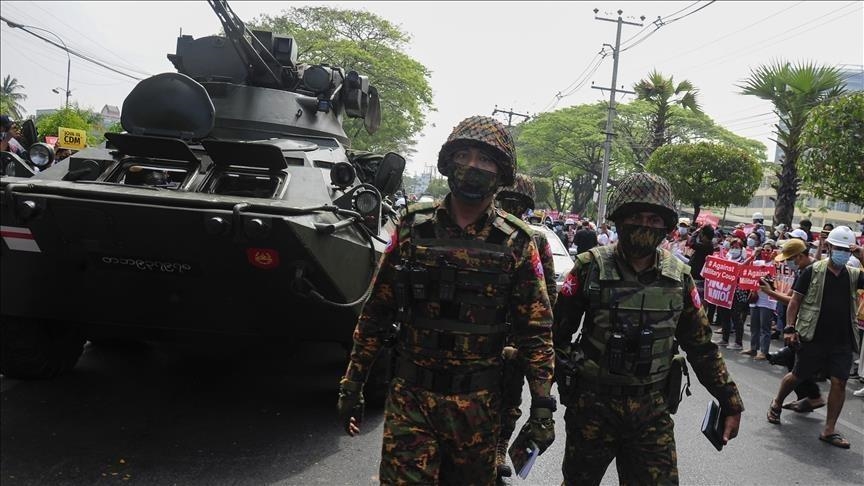ASEAN urged to end 'security cooperation' with Myanmar junta
Junta has reneged on regional bloc's '5-Point Consensus' thus warranting disengagement at all security levels, civil society group says

ISTANBUL
Calling on Southeast Asia's regional bloc to end "security cooperation" with the military junta ruling Myanmar, a civil society group on Thursday urged the member states to halt any supplies of lethal assistance to that country's military.
Pointing to the Myanmar military leadership's "apparent disregard" for repeated calls by the Association of Southeast Asian Nations (ASEAN) to de-escalate violence and find peaceful resolutions through inclusive dialogue, the Canada-based group called on the regional countries to "suspend security cooperation" with Myanmar "at all levels."
To commemorate the 61st anniversary of Myanmar's first military coup in 1962, a 46-page report was released by the Associates to Develop Democratic Burma, a group founded in 1990 and works to promote the development of democracy in the Southeast Asian country.
"Evidently, the Commander-in-Chief of Myanmar military forces Senior General Min Aung Hlaing has not only reneged on his consent regarding the ASEAN 5PCs (Five-Point Consensus), but he has instead escalated the use of extreme violence by ramping up air strikes against civilians in armed conflict regions as part of the military’s strategy to terrorize communities of democratic resistance into submission," said the group.
It called on the ASEAN to "ensure that none of the ASEAN member state is involved in supplying Myanmar military forces with lethal assistance and related support, such as the sale of aviation fuel" and "consider adopting stringent measures to prevent ASEAN-based commercial and financial institutions from financing Myanmar security ministries and their commercial affiliates."
ASEAN is a political and economic union of 10 member states, including Myanmar, in Southeast Asia. It promotes intergovernmental cooperation and facilitates economic, political and sociocultural integration between its members in Asia-Pacific.
Soon after the February 2021 coup launched by the Myanmar's military, locally known as the Tatmadaw, ASEAN issued the Five-Point Consensus plan, also called the 5PCs, when Brunei was at the helm of the regional grouping.
The military takeover triggered mass protests in Myanmar, with the junta's forces killing more than 1,500 people in a crackdown on dissent, according to the Assistance Association for Political Prisoners, a local monitoring group.
Lately, the protests have died down.
ASEAN's 5PCs called on all parties in the Buddhist-majority Myanmar to cease violence in the country and "exercise utmost restraint."
Urging "constructive dialogue among all parties," the regional bloc said that doing so would involve seeking "a peaceful solution in the interests of the people."
It also appointed a special envoy of the ASEAN chair to facilitate mediation of the dialogue process. The envoy would be assisted by ASEAN secretary general.
Under the 5PCs, ASEAN also provides humanitarian assistance, through its Coordinating Centre for Humanitarian Assistance on Disaster Management (AHA Centre), to Myanmar, while the special envoy was assigned to undertake visits to Myanmar to "meet with all parties concerned."
ASEAN has held several summits and meetings since the latest military coup in Myanmar but has stopped short of inviting junta representatives.
According to UNICEF, the number of displaced people has risen to more than 1.5 million in the last two years since the junta took power, while at least 2,890 people lost their lives at the hands of the military and those working with them.
Anadolu Agency website contains only a portion of the news stories offered to subscribers in the AA News Broadcasting System (HAS), and in summarized form. Please contact us for subscription options.







